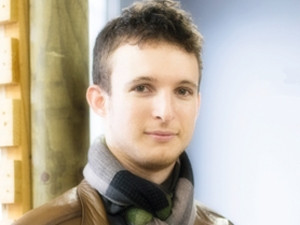
Howzit, molo, hoe gaan dit? These are simple enough greetings that most South Africans are capable of exchanging across languages. Move past these platitudes, however, and vocabularies tend to dry up fast. The simple truth is that, 20 years into our democracy, basic communication across cultures remains a massive hurdle to integration.
Glenn Stein came to this realisation during a year abroad studying Spanish on a Rotary exchange in Argentina. Returning home, Stein registered for an IT software development course at Varsity College. Toward the end of 2011, he attended a Vodacom developer programme and subsequently entered into the programme's AppStar Challenge competition. Stein's entry, a mobile phrase app, placed third and provided the necessary encouragement to explore his interest in working with language development.
"That moment was when everything really started," recalls 25-year-old Stein, who went on to join the Bandwidth Barn VeloCITY Incubation programme. "The incubation programme was really my introduction to becoming an entrepreneur with a focus toward making a social impact." The result of which was the creation of Aweza.
Aweza's key departure from Stein's previous mobile phrase app is the introduction of an audio pronunciation feature. Together with a newly formed team of designers and developers, Stein's initial challenge in creating this feature was locating an affordable recording process for the audio.
Crowd sourcing
"The first idea was to put a studio into my car with a netbook and music software Ableton," recalls Stein. "We then came up with the better idea of getting the users of the app to submit their own audio pronunciations and moderate each other. That way we could crowd source content and moderation."
Through its use of crowd souring, it's Stein's hope that a community will form around Aweza. "It makes for a heightened experience when you tap into a broader knowledge base, set of opinions and sentiments," he says. "The content becomes much richer than if we were to simply rely on a small team and opens the app up to going in directions we didn't think were possible. It's as much a social as it is a technological experiment."
Using a speech synthesis engine developed by the CSIR that caters to all 11 official languages, the audio is automatically translated into text. This text is then reviewed by an accredited translation agency to determine its level of accuracy.
Maximum exposure
"Currently, we have a total of 400 approved phrases, primarily comprised of English, Afrikaans and Xhosa submissions," says Stein.
The dream is to move from being simply an app, to an initiative that leverages mobile technology to break down language barriers in South Africa and encourage inter-cultural engagement.
Essential to Aweza is the element of competition. Users can up-vote pronunciations, creating a point system ranking, which incentivises participation, a process known as 'gamifying'.
"When it's social, you're able to connect with your friends, which creates competition," says Stein. "It makes the process of learning more fun, especially among the youth, and generally improves an app's success rate."
Medi-Phrases
Did you know?
Only 6% of medical consultations in the Western Cape are actually done in the home language of the patient.
What is Medi-Phrases?
A side-project powered by Aweza, it's a tool built to aid doctors and health care professionals bridge the language gap between themselves and their patients.
How?
Using the Aweza programming and partnering with doctors from the Open Medicine Project of South Africa - an m-health startup - a database of medical-related phrases in multiple languages has been created that will primarily assist with communicating patient history and advice on post-consultation care.
When?
Hoping to launch by the end of 2014.
Aweza, freely available for download, has no revenue stream - a necessary element in allowing the app to spread, believes Stein. "It starts with building the brand. Making it free and not putting ads on will allow Aweza to receive maximum exposure, which is what's most important to us right now."
"We've currently got 5 000 downloads on Android. It's not huge but it's the start we wanted," notes Stein. "We didn't want to launch on such a large scale as we're still trying to figure out exactly what works and what doesn't. It's a long-term initiative."
Primarily downloaded in Gauteng, with Afrikaans the most popular language, the long-term goal is to see Aweza used in schools as a learning tool for students.
"With more funding, we'd like to make a lighter version available for feature phones and BlackBerries, piggybacking on schools in South Africa that are beginning to use Android tablets. The goal is to make as much of the content available offline as possible."
As more people join the community and contribute towards building the crowd-sourcing platform, it's Stein's hope that Aweza will become something more than simply a fun way to kill time. "The dream is to move from being simply an app to an initiative that leverages mobile technology to break down language barriers in South Africa and encourage inter-cultural engagement."
First published in the August 2014 issue of ITWeb Brainstorm magazine.
Share